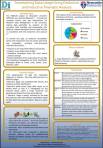iridium – summary of thematic analysis of RDM researchers’ requirements from interviews
November 1, 2012 Leave a comment
iridium thematic analysis – summary of qualatative interviews
Process
- A two stage thematic analysis was conducted on the interview data generated by the Iridium Project.
- 29 Interviews underwent Analysis.
- The first stage of Analysis was deductive, and conducted by interviewers on the transcripts of interviews.
- The deductive analysis was categorised into 5 initial themes:
- Perception – To ascertain interviewee’s concepts of data and data management.
- Purpose – To ascertain interviewee’s data usage and destination.
- Process – To ascertain interviewee’s data lifecycle.
- People – To ascertain the people involved in the data lifecycle.
- Provoking – A Catchall to gather any other salient points expressed by interviewees.
- Interim Categorisation Results:
- The second stage of the analysis was inductive.
- Uses results of deductive analysis as a starting point – attempts to build meaningful themes from whole data corpus.
- Analysis done by a single researcher.
- Generates a new set of themes
Final Themes
Diversity
Informed by elements from across the deductive categories, in particular perceptions of data usage, longevity and security, purpose of data, the people involved and the processes required.
The overarching theme is that across many aspects of data management there is a great deal of diversity amongst users and any policy should enable users to achieve best practice rather than apply a one size fits all “solution” to data management.
Data Analysis
Generated mainly from the process and perception of data and its life-cycle, a Data Analysis theme was apparent across many interviewees.
The consensus was that much of the processing of data that currently takes place on local machines would be more efficiently accomplished on larger scale servers, but that users are largely unaware that such services may exist in the university.
Longevity / Life Cycle
The longevity of data was a strong theme from across all categories. There was a strong consensus from interviewees that data should never be thrown away. There should be a separate system for archiving data and current data.
Any policy should attempt to support long term storage of research data, and the access to it, as well as current data.
Responsibility
The strongest theme coming from the people category was that of responsibility – who should be doing what with the data, with storage, with security and with access. Many interviewees were unclear about what falls to them and what the responsibility of the university is.
The recommendation to take forward is to make the situation clear, and provide training if needed for users.
Sharing and Collaboration
Another strong theme that emerged from across the initial categories is the concept of data access, in particular sharing data with collaborators, both internal and external. This becomes problematic with very large data sets, or with collaborators insisting on using “their” systems.
The university should provide a method of sharing data post publication, which should be linked to publications and to researcher’s profiles, and provide flexible guidelines on sharing with collaborators.
The full thematic analysis report is available to download: http://research.ncl.ac.uk/media/sites/researchwebsites/iridium/iridium_interview_thematic_analysis_5_7_2012_v1_PH.pdf



